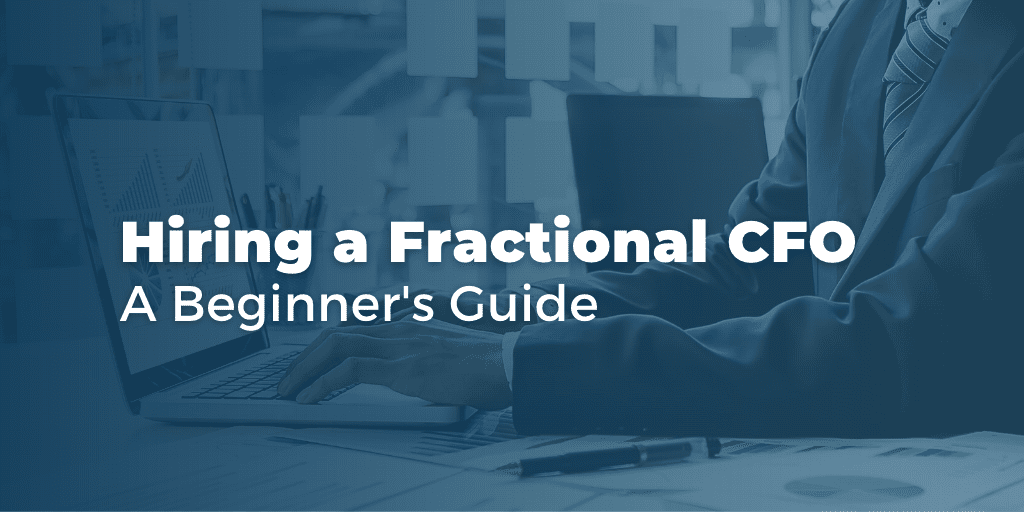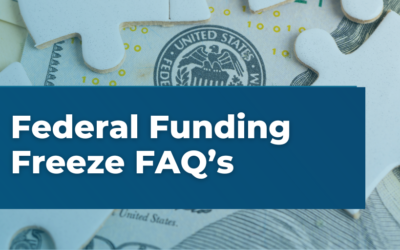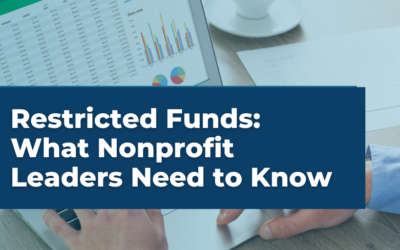Hiring a Fractional CFO: A Beginner’s Guide
Managing finances properly is essential for the growth of any business or nonprofit. It can be challenging to handle everything on your own though, or find a full-time staff member to oversee everything from bookkeeping to strategy. That’s where a Fractional Chief Financial Officer (or CFO) steps in! A part-time financial expert on your team to oversee strategy, reporting, and compliance will elevate your leadership to the next level. This guide will help you understand what a Fractional CFO is, the benefits of having one on your staff, how to successfully vet/hire one, and the other key considerations you should keep in mind when working with one.
What is a Fractional CFO?
A Fractional CFO is a professional who provides financial consulting services to businesses on a part-time or project basis. They work remotely and provide financial insights, advice, and support as dictated by the client. Instead of working for a single organization, they offer their services to multiple companies or nonprofits, usually for a few hours per week.
Why would a business hire a Fractional CFO?
- Expertise without the Expense: Fractional CFOs offer financial expertise without the long-term commitment and expense of hiring a full-time CFO.
- Diverse Experience and Knowledge: Fractional CFOs work with multiple companies, bringing a wealth of diverse experiences and knowledge to the table.
- Scalability: Hiring a Fractional CFO allows businesses to scale up or down based on their financial needs.
- Confident Financial Decision-making: With the guidance and support of a Fractional CFO, businesses can make better financial decisions and achieve their financial goals more effectively.
Why would a nonprofit hire a Fractional CFO?
- Tax and Compliance Expertise: Fractional CFOs often have specialized expertise in nonprofit accounting and can help nonprofits navigate complex tax regulations and reporting requirements.
- Periodical Flexibility: Crafting a year-end budget or working on tax returns typically requires more financial oversight than developing programs. Nonprofits can reduce or increase the hours of their Fractional CFO depending on the time of year.
- Strategic Grant Allocation: Because of their experience working with many organizations, they understand strategic grant allocation and can help nonprofits allocate funding to keep funders happy and expedite growth.
- Improved Financial Management: With the support and guidance of a Fractional CFO, nonprofits can make better financial decisions and more effectively manage their budgets.
- Data-Based Decisions: Understand your financial position with dashboards and easily monitor key performance indicators, such as program expense ratios.
The Role of a Fractional CFO
What does a Fractional CFO do?
Financial Planning and Analysis
A Fractional CFO is responsible for developing the company’s budget and forecasting future financial performance. They use financial models to forecast the company’s future financial performance and identify areas for improvement.
Financial Reporting and Compliance
They ensure that the company’s financial statements are accurate, complete, and comply with accounting standards and regulations. They oversee the preparation of financial reports and communicate financial information to stakeholders.
Cash Flow Management
They manage the company’s cash flow by monitoring accounts receivable and payable, forecasting future cash needs, and making fundraising or investment decisions.
Risk Management
The Fractional CFO identifies and manages financial risks that could impact the company’s financial performance, such as market risks, credit risks, and operational risks. They develop risk management strategies to mitigate these liabilities.
Strategic Financial Advice
They provide strategic financial advice to senior management to help them make informed business decisions. They use financial data to identify growth opportunities, evaluate earning potential, and optimize the company’s performance.
Cost Reduction
Fractional CFOs may identify areas where costs can be reduced, such as by improving procurement processes or renegotiating contracts with vendors.
Staff Training and Development:
Fractional CFOs may train and mentor staff to improve financial literacy and enable them to make better financial decisions.
What does a Fractional CFO do day-to-day?
A Fractional CFO is at the disposition of the organization, providing them with whatever services they may find necessary at any point in time. Daily, a Fractional CFO could:
- Review financial statements and create reports to help a business owner or nonprofit CEO make an informed decision
- Train a full-time staff member to ensure accurate and timely financial reporting
- Update documents to manage cash flow (accounts receivable and accounts payable)
- Develop budgets and forecasts
- Provide accurate numbers for tax planning and compliance
- Prepare a strategy for business growth and expansion, pricing, and cost management.
- Implement internal controls and procedures to mitigate financial risks
- Prepare a financial presentation for investors or a Board of Directors
- Monitor industry trends and benchmark the organization’s performance against competitors.
Benefits of Hiring a Fractional CFO
Cost-effective Alternative to Hiring a Full-time CFO
A fractional CFO offers a cost-effective alternative to hiring a full-time CFO. A full-time CFO doesn’t only require a full-time salary. They also require the different benefits that you may provide to your employees.
Access to Specialized Expertise and Experience
Fractional CFOs typically work with multiple clients in different industries and financial situations, allowing them to bring unique solutions to the table. This can be especially valuable for businesses or nonprofits that are focused on immediate growth.
Flexibility to Scale Up or Down as Needed
Fractional CFOs can provide financial expertise and support on a part-time or project basis, allowing businesses to adjust their financial management resources as their needs change. This can be especially helpful for businesses in a transition period, as it allows them to easily adapt to fluctuating financial needs.
Objective Financial Analysis
Fractional CFOs can provide unbiased, objective financial analysis of a business’s operations, allowing for more informed decision-making. They can also identify areas where costs can be reduced or efficiencies can be gained, helping businesses to become more financially stable.
Improved Financial Reporting
Fractional CFOs can help businesses to improve their financial reporting processes, ensuring accuracy and compliance with relevant regulations. This can be especially important for businesses or nonprofits looking to improve their financial transparency.
Accurate Forecasting
Fractional CFOs can help businesses to develop and implement strategic plans and forecasts, which can be crucial for driving growth and success. They can also provide ongoing financial management support, helping businesses to stay on track and achieve their financial goals.
Enhanced Funder Relations
There’s nothing better than being handed a clear, well-presented financial report. Fractional CFOs can help organizations manage their relationships with investors/funders, ensuring clear and accurate financial reporting and communication. This can also help to build trust with investors, leading to more investment opportunities in the future.
Risk Management and Compliance
Fractional CFOs can typically spot risks because of their experience with multiple organizations. This can help to avoid costly fines or legal issues, and ensure that the business or nonprofit is operating ethically and responsibly.
How much does a Fractional CFO cost?
The cost of a fractional CFO can vary depending on a few factors:
- Experience and qualifications
- The complexity of the company’s financial needs
- Amount of time required for the CFO to complete the work
- Hourly rate or monthly retainer fee charged by the CFO
- Additional fees for specific services, such as financial modeling or fundraising
Some fractional CFOs charge hourly rates that can range from $100 to $400 per hour, while others charge a monthly retainer fee that can range from $1,500 to $10,000 per month. Additional fees for specific services may also apply. Ultimately, the cost of a fractional CFO will depend on the specific needs of the company and the agreement negotiated with the CFO. It typically involves requesting a quote based on the company’s unique requirements.
How to Find the Right Fractional CFO
Finding the right Fractional CFO isn’t easy. Here are some places you can look for a Fractional CFO:
- Referrals from trusted sources such as colleagues, business associates, or industry associations
- Online directories and marketplaces that connect businesses with Fractional CFOs, such as CFOshare.
- Freelance platforms such as Upwork or Fiverr offer access to a global network of freelancers
- LinkedIn can be beneficial for connecting with Fractional CFOs and other industry experts
- Local and national CPA or accounting firms, which may offer Fractional CFO services
- Professional associations and organizations, such as the National Society of Accountants, the Association of Chartered Certified Accountants, the American Institute of Certified Public Accountants, or the Quickbooks ProAdvisor Directory.
Remember to research and compare different Fractional CFOs before making a decision. Look for someone who has relevant expertise and experience, understands your business or nonprofit’s unique financial needs and goals, and can provide tailored financial guidance and management to help you achieve them.
Questions to Ask when interviewing a Potential Fractional CFO
Being thorough in your interview with a Fractional CFO candidate will save you headaches down the road. Here are some questions that we recommend:
- What is your experience working with companies or nonprofits in my industry?
- Can you give me an example of how you helped an organization improve its financial performance?
- How do you approach financial forecasting and budgeting?
- What are your thoughts on managing cash flow?
- Can you explain your approach to risk management?
- How do you measure the financial health of a company?
- What is your experience with fundraising?
- How do you stay up-to-date on changes in tax and accounting regulations?
- What software and tools do you use to manage financial data and reporting?
- What is your availability, and how much time do you typically spend with each client?
Steps to Onboarding a Fractional CFO
Congratulations! You’re ready for your new part-time team member. Here are some things to keep in mind as you prepare them to join your team.
-
- Welcome your new Fractional CFO: Start by welcoming your new Fractional CFO to your team and introducing them to the individuals they’ll be collaborating with. Make introductions and ensure they feel comfortable in their new role.
- Share information and access: Provide your new Fractional CFO with access to your financial records, reports, and any other relevant information. This will help them get up to speed quickly and understand your business’s financial health.
- Share Access: Share access to your financial records, reports, and other relevant information with your new Fractional CFO. This may include sharing Google Drive or Dropbox folders and providing logins and passwords to financial software that you use.
- Discuss goals and objectives: Schedule a meeting to discuss your business’s financial goals and objectives. This will give your Fractional CFO a clear understanding of what you hope to achieve financially.
- Review and analysis: Your Fractional CFO will review and analyze your financial information to understand your business’s financial health and identify areas for improvement. They will also work with you to develop financial strategies and plans.
- Develop an action plan: Based on their analysis, your Fractional CFO will develop an action plan to help you achieve your financial goals. This plan should be tailored to your business’s unique needs and take into account any challenges or opportunities.
- Schedule regular meetings: Set up regular meetings with your Fractional CFO to review progress, discuss any issues or concerns, and receive regular financial reports. This will help you stay informed and make informed, data-based decisions
- Ongoing support and communication: Your Fractional CFO should provide ongoing support and communication, answering any questions or concerns you may have and adjusting strategies as needed. Establish a plan on how you will communicate daily.
By following these steps, you can successfully integrate your new Fractional CFO into your team and begin leveraging their financial expertise.
Best Tools to Use with a Fractional CFO
The best software and online tools to use when working with a fractional CFO depend on your specific needs and the type of work that you will be doing together. Your fractional CFO will likely have experience with many of these tools and can recommend the ones that will be most effective for your business.
- Accounting Software: Accounting software like QuickBooks, Xero, or Karbon can help you keep track of your financial transactions and generate financial reports. Your fractional CFO can use this software to manage your bookkeeping, reconcile accounts, and generate financial reports.
- Budgeting and Forecasting Tools: A budgeting and forecasting tool like Workday or Planful can help you create budgets and forecasts, and track your actuals against your projections. Your fractional CFO can use these tools to help you create accurate financial projections and make informed business decisions.
- Financial Planning and Analysis (FP&A) Tools: FP&A tools like Anaplan orProphix can help you perform complex financial modeling and analysis. Your fractional CFO can use these tools to build financial models, analyze financial data, and create detailed reports that help you make informed decisions.
- Document Management: Document management tools like Google Drive or Dropbox can help you securely share financial documents and reports with your fractional CFO. Your fractional CFO can use these tools to access your financial data and documents and collaborate with you in real time.
- Communication and Project Management: Communication and project management tools like Slack or Trello can help you and your fractional CFO stay in touch and stay on top of important financial tasks and deadlines. These tools can help you streamline communication, set up task lists and due dates, and manage your financial projects effectively.
Ready to hire a Fractional CFO?
In conclusion, hiring a fractional CFO can be a cost-effective solution for businesses needing financial expertise. At Velu, we provide top-notch CFO services on a part-time or project basis. If you’re ready to take your business to the next level, visit our Fractional CFO page or get started with a free consultation. Even if we aren’t the best fit, we can point you in the right direction.





